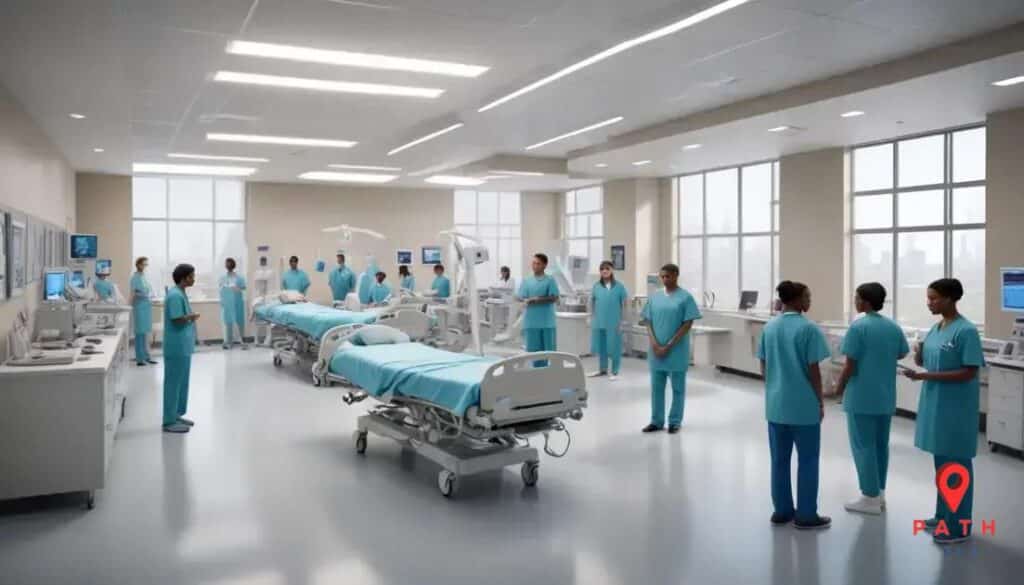Top US hospitals 2025: what to expect for healthcare

Anúncios
To choose the right hospital for your needs, consider its reputation, available specializations, and accessibility to ensure you receive the best possible care.
Top US hospitals 2025 promise to transform the landscape of healthcare. From groundbreaking treatments to cutting-edge technology, these institutions are leading the charge. Curious about what this means for your health? Let’s dive in!
Emerging trends in top US hospitals
As we look toward the future, emerging trends in top US hospitals are shaping the way healthcare is delivered. Innovations in technology, patient care strategies, and hospital design are all part of this exciting transformation.
One key trend is the increasing use of telemedicine. This allows patients to receive care from the comfort of their homes, making healthcare more accessible.
Key Innovations in Hospitals
Advancements in medical technology are also crucial. For instance, robotics and AI are being integrated into surgeries and diagnostics, improving accuracy and outcomes.
Additionally, patient-centered care is becoming more prominent, focusing on the needs and preferences of patients during their treatment.
Anúncios
Focus on Sustainability
Another emerging trend is sustainability in healthcare. Many hospitals are adopting green practices, such as energy-efficient buildings and sustainable waste management.
According to the Healthcare Construction+Operations, this not only reduces costs but also promotes a healthier environment.
- Telemedicine and remote monitoring solutions.
- Integration of AI and robotics in medical procedures.
- Focus on eco-friendly hospital designs.
| Category | Key Trend | Impact |
|---|---|---|
| Telemedicine | Remote care access | Convenience and accessibility |
| AI & Robotics | Used in surgery and diagnostics | Higher precision and better outcomes |
| Sustainability | Eco-friendly hospital design | Reduced costs and greener care |
| Gene Therapy | Treats genetic disorders | Targets root causes of disease |
| Immunotherapy | Boosts immune response to cancer | Improved cancer treatment results |
| Wearable Tech | Tracks health metrics | Enables real-time monitoring |
| EHR Systems | Electronic health records | Faster data access for providers |
| Patient-Centered Care | Focuses on patient preferences | Enhances satisfaction and outcomes |
| Chronic Disease Support | Support programs and monitoring | Better management and guidance |
| Hospital Selection | Reputation, specialization, location | Ensures best care and convenience |
Innovative treatments on the rise
Several innovative treatments are emerging in healthcare, paving the way for more effective and personalized care. These advancements can significantly change patient outcomes and experiences.
One notable example is the use of gene therapy. This treatment targets the root causes of diseases by altering genes within a patient’s cells.
Breakthroughs in Cancer Treatment
Cancer therapies are also evolving rapidly. Immunotherapy harnesses the body’s immune system to fight cancer cells more effectively.
Another exciting development is CAR T-cell therapy, which modifies a patient’s T-cells to better attack cancer.
Advancements in Chronic Conditions
Treatments for chronic diseases are also improving. For instance, continuous glucose monitors are now paired with insulin pumps to manage diabetes more efficiently.
This technology allows for real-time blood sugar monitoring, helping patients to maintain stable levels.
- Gene therapy for genetic disorders.
- Immunotherapy and its growing success rate.
- Continuous glucose monitoring systems for better diabetes management.
For more detailed information on these groundbreaking treatments, check out the National Cancer Institute. These advancements are setting the stage for the future of healthcare.
Technological advancements in healthcare

Technological advancements in healthcare are transforming the way medical services are delivered. These innovations are making healthcare more efficient, accessible, and personalized.
One significant advance is the use of electronic health records (EHRs). EHRs streamline patient information management, allowing healthcare providers to access vital data quickly.
Wearable Health Technology
Wearable devices, such as fitness trackers and smartwatches, are gaining popularity as they help monitor health metrics continuously. These gadgets encourage individuals to take charge of their own health by tracking steps, heart rate, and sleep patterns.
Many wearables now connect to health apps that can share data with healthcare providers, enhancing patient care.
Artificial Intelligence in Diagnostics
Artificial Intelligence (AI) is another groundbreaking technology in healthcare. AI enhances diagnostics by analyzing medical images and identifying conditions faster than traditional methods.
For example, AI algorithms can help detect tumors in radiology images, leading to earlier and more accurate treatment.
- Integrating EHRs for better data management.
- Expanding the use of wearables for health monitoring.
- Utilizing AI for improved diagnostics and patient outcomes.
To learn more about these advancements, check out the Office of the National Coordinator for Health Information Technology. This source provides insights into how technology is enhancing healthcare delivery.
Patient care improvements
Patient care improvements are essential in today’s healthcare landscape. New methods and technologies are being implemented to enhance the overall experience for patients and ensure better outcomes.
One major improvement area is the focus on patient-centered care. This approach involves understanding and respecting patient preferences, needs, and values in all aspects of their care.
Enhanced Communication
Communication between healthcare providers and patients has significantly improved. Tools such as patient portals allow individuals to access their health information, appointment schedules, and lab results easily.
These portals also encourage patients to ask questions and engage more actively in their healthcare decisions.
Stronger Support Systems
Support systems are crucial for patients, especially those managing chronic illnesses. Programs that connect patients with care coordinators or support groups can greatly enhance their treatment journey.
These systems provide guidance and resources, helping patients feel more empowered and informed.
- Implementing patient-centered practices for better experiences.
- Using technology to streamline communication between patients and providers.
- Providing resources for chronic disease management and support.
For more insights on patient care improvements, visit the National Institutes of Health, which offers research and resources on health advancements.
How to choose the right hospital for your needs
Choosing the right hospital for your needs is crucial for ensuring you receive the best care possible. With so many options available, it can be overwhelming to make a decision that suits your health situation.
One important factor to consider is the hospital’s reputation. Research the hospital’s ratings and patient reviews online to gauge the quality of care they provide.
Specializations and Services
Different hospitals may specialize in various areas of medicine. Make sure the hospital you choose offers the services that fit your specific health needs.
For instance, if you require surgery, select a hospital known for its surgical expertise.
Location and Accessibility
Location is another essential consideration. A hospital that is easily accessible can be beneficial, especially in emergencies. Consider facilities that are close to your home or work.
Check if they offer convenient parking and public transportation options as well.
- Assess the hospital’s reputation and patient satisfaction.
- Identify specializations relevant to your health needs.
- Consider the location and accessibility for ease of visits.
For further guidance on selecting a hospital, visit the Centers for Medicare & Medicaid Services, which provides resources on healthcare quality and hospital comparisons.
In summary, selecting the right hospital is essential for your health
As we discussed, there are key factors to consider when choosing a hospital. Look for a facility with a good reputation and the necessary specializations to address your medical needs.
Accessibility and location also play a big role in ensuring you receive timely care. By being informed, you can make a decision that supports your health journey.
Ultimately, prioritizing these aspects will help you find the best care possible when you need it the most.
FAQ – Frequently Asked Questions about Choosing the Right Hospital
What should I consider when choosing a hospital?
You should look at the hospital’s reputation, specializations, location, and accessibility to ensure it meets your healthcare needs.
How can I find hospital ratings and reviews?
You can find hospital ratings and reviews online through health websites, patient forums, or by checking government healthcare resources.
Why is patient-centered care important?
Patient-centered care prioritizes individual patient needs and preferences, leading to better satisfaction and health outcomes.
What resources are available for comparing hospitals?
You can visit the Centers for Medicare & Medicaid Services for detailed comparisons of hospitals and their quality of care.




